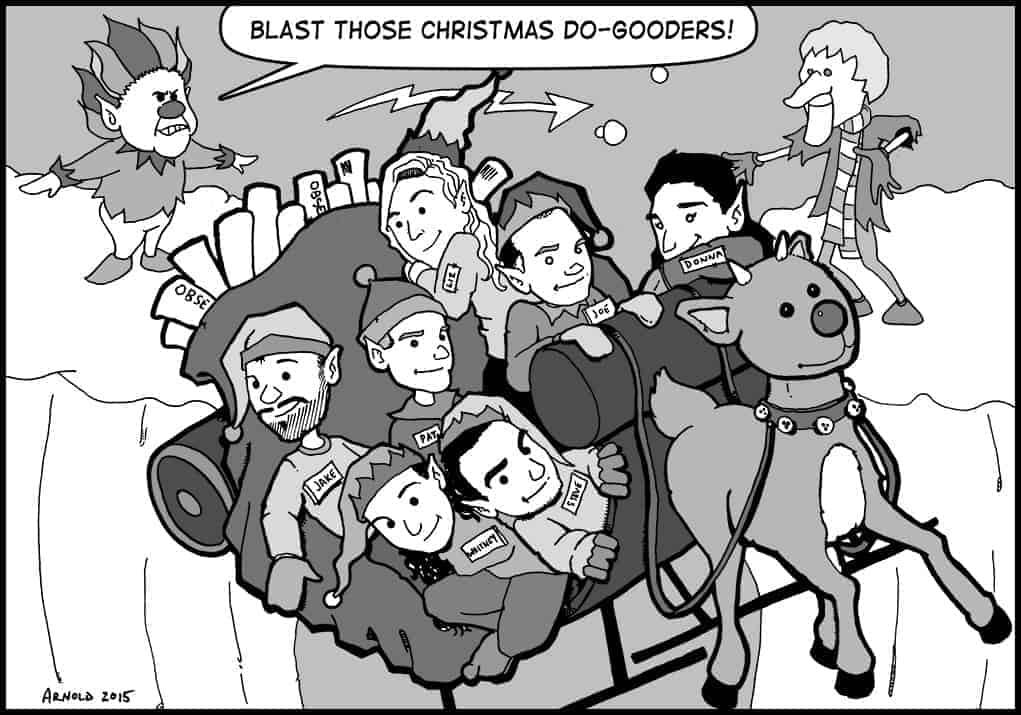As more people keep it safe with greetings of Happy Holidays instead of Merry Christmas, and rush through the mall to find the perfect gift, local pastors reflect on how we can get back to the real meaning of the season as Christmas becomes increasingly secular and focused on what’s under the tree instead of who’s around it.
“That idea of what I think the secular Christmas is all about is about how much can I get and how do I keep everybody happy. It’s all about consumption, basically. We’ve been trying to help people realize that there’s more to it than that and it actually may be about how much can you give,” says Dave Jagger, pastor at Trinity United Church in Elmira.
He says they do a variety of activities to help the congregation connect to the community around them and see beyond themselves, at Christmas and throughout the year. They make dinner for the community every month for their Community Can Dine event, and at Christmas it’s the full turkey dinner. Attendees pay what they can.
“That’s one way we’re helping them realize it’s about providing for others, not just about what you’re going to get or how much you spend,” Jagger said.
In conjunction with Woolwich Community Services in October they put together a winter wear drive. Some 70 to 80 people were provided with winter clothing, boots, mittens, hats, and snow pants, as requested. He says this helps them spread out the Christmas season so it’s not all focused on one day.
“It’s a season, it’s not a day. If it’s a day then everything builds up to that one event and it has to be perfect and if it’s not it’s awash, it seems like,” Jagger said.
They incorporate that sentiment of Christmas being a season instead of a day by having their Christmas pageant the weekend right before the kids go back to school, which is in January.
As part of their church service they’ve been working on four-week long skills and markers of Christian faith, with November’s unit on serving and December’s on generosity. At the end of the month members of the congregation share how their experiences.
“This past Sunday one of the stories that one of the members of the congregation talked about was how their attitude shifted especially at Christmas. She had gone home and looked at her closet, and she pulled 10 per cent of her clothes out and went and donated them to an organization that’s working with refugees. It’s counter cultural. But for her that was a new idea to do that,” Jagger said.
He says Christmas celebrations have been shifting toward a more secular holiday for decades, but what’s been accelerating recently is how people don’t feel the need to be connected to the church during the Christmas season.
“Elmira has the reputation of being more Christian and traditional, however the more houses they build and the more people who move into Elmira the less that’s really the case,” Jagger said.
Whereas the church used to be packed for the Christmas Eve services, now it’s not. He said it’s up to the church to remind people they’re there and what Christmas is about.
They do a 6 o’clock and a 8 o’clock service, with the band at the first one and the choir at the second one to try to adapt times that work best for families.
“We have a nativity scene out on the lawn here. There’s one other church in town who does that. None of the rest do that,” Jagger says of the shift to a more secular society.
Fred Redekop, pastor at Floradale Mennonite Church, says there’s often too much pressure on people for everything to be perfect.
“Families have told me there’s more pressure with the gift-giving and the pressure to be happy during this time. Many people find that difficult. There’s just too much pressure to be happy that it just isn’t going to happen. … There’s still that pressure amongst our people that’s difficult to bypass during the season,” Redekop said.
As the church’s pastor for nearly 25 years, he says he’s seen the holiday become more secular, but it’s been happening since the ‘50s. In terms of church life, they’ve focused mainly on worship to keep the attention on the meaning of Christ. But with the pressure of gift giving, they’ve tried to have a project each year to allow people to give beyond themselves.
“So this year we’re inviting people to buy things for a relief kit, towels and toothbrushes, all that, so that gives them a sense that all the gifts that they buy are not just for their family, but for beyond that.”
The Christmas celebration has become more about family and the giving of gifts, but for Redekop it’s not the meaning of Christmas. He says the church is trying to continue to proclaim the message of the birth.
“But it’s a real challenge. We try not to be negative toward the society, but try to say well we can also celebrate in this way, by focusing on worship and giving beyond ourselves. The shift I think to more secular values around Christmas has been here for a couple generations already,” he said.
As for companies and individuals switching from Christmas cards to holiday cards or saying Happy Holidays instead of Merry Christmas, Redekop that’s of no concern to him.
“It’s not society’s role to help us celebrate Christmas. They can celebrate however they want – I try not to lambaste the consumerism, but I try to have them focus on the biblical story,” he said. “Also, instead of buying all the things for ourselves, we invite people to give beyond themselves to others in need in the world in order for other people to experience a better life.”
On a lighter note, he mentions the recent controversy over Starbucks having a simple red cup this year for the holiday season instead of ones in the past which had snowflakes or reindeer.
“It’s not Starbucks’ role to tell the Christmas story. It’s the church’s role to tell that story. I like coffee too, though,” Redekop said with a laugh.









